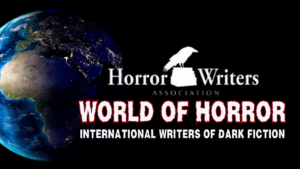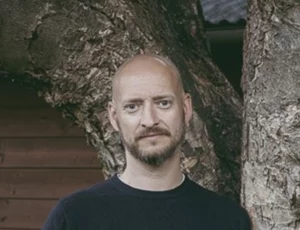World of Horror: Interview with Johann Thorsson

Johann Thorsson is an Icelandic author whose short stories have appeared in publications both in Icelandic and English, such as Fireside Fiction and The Apex Book of World SF series.
His first novel, the crime-horror novel Whitesands, will be out from Canelo UK’s new horror imprint in early 2024 and blends Nordic noir with the supernatural. He grew up partly in the Middle East and Eastern Europe but now lives in Reykjavik with his wife, two kids and ever-decreasing space on his bookshelves.

What was it about the horror genre that drew you to it?
I think maybe it was the other way around; none of the other books I could get my hands on had any horror in it. They felt like they were missing a point or an opportunity. I remember a moment in my school library when I had a copy of the graphic novel of The Lord of the Rings and saw Gollum in the cave and thought “What. Is. This?” and being absolutely blown away. I think I’ve always been chasing that high since.
Is there a horror tradition in your country, in your culture? A taste for horror, a market? Not necessarily literature; perhaps oral tradition too.
Yes, a rich one. Most of them have to do with ghosts or sea monsters. One of our better-known folk tales has to do with a ghost on horseback that abducts a woman.
However, there isn’t a strong tradition of horror in literature. Mostly folk tales. Almost used to be that the existence of ghosts was a given; it was just a matter of how much mischief they got up to. There is not much of a market for horror though, not really.
Who are some of your favorite characters in horror, internationally and/or in your own culture?
Gollum. Even though The Lord of the Rings is clearly not a horror novel, he is a horror character. His storyline is pure horror. His soul is corrupted by a cursed ring and he lives in eternal torment.
Do you make a conscious effort to include characters and settings from your country in your writing and if so, what do you want to portray?
I do! I either do it very overtly by having the story clearly take place in Iceland or I go super sneaky and just slip in a small reference. I think it is not something I want to portray, it just seems to happen. Occasionally I do get asked to write for anthologies for the very reason that I am Icelandic and so the story sort of has to include a reference. Other times it is because the country is such a big part of my thoughts that I can’t help but to. I also love sneaking in all sorts of references and I always take a chance to include Iceland.
Whitesands has a subtle reference to Iceland even though the novel is about American characters and takes place completely in the U.S.
If you are not a native English speaker, but write in English, do you first think of horror in your native language or English? How do you draft them in your mind, in English or your mother tongue?
So! I moved abroad at the age of nine and went to an American school. I am fully bilingual but I prefer to write horror in English because Icelandic horror words seem childish to me. It’s something I can’t shake. So when I write in Icelandic I tend to write more concrete stories; modern and gritty. In English, I write with more emotional language and am able to allow more fantastic words in. Horror in English just works for me.
These days I mostly write in English.
What has writing horror taught you about the world and yourself?
The main lesson for me is that I am convinced that nothing supernatural exists, at all. No ghosts or monsters, but also no angels or gods. We are mammals with overly-sized brains and are creating a horror show of the planet.
The horror that exists in everyday life far exceeds anything in fiction. A young girl having been raped and then either forced to marry her rapist, or after having an abortion, put on trial for that very abortion.
Mothers holding babies as they drown in the Mediterranean within sight of land, while holiday goers sip cocktails on the beach.
Climate scientists are shouting warnings to us about the state of the planet as we fly around the world and eat steaks.
This is all pure horror, none of it supernatural.
How have you seen the horror genre change over the years? And how do you think it will continue to evolve, both in the US and in your country?
The horror genre has gone from sleazy and cheesy to being mainstream and slick. This I base on the rise in popularity of horror movies in the 80s to what I consider the pinnacle of horror, True Detective season one. A lot of horror writing tries too hard.
Horror is having a real resurgence right now and we are seeing new stars in Catriona Ward, Victor LaValle, Gabino Iglesias, Michael Wehunt, and Gemma Files, among a whole host of others.
In Iceland, horror has not evolved much and is still considered just for teenagers.
How do you feel the International horror writing community has been represented thus far in the market and what hopes do you have for representation going forward?
I’m not sure I’m the best to answer this, as I write in English for an international market.
If they write in English they have just as good a chance to land a spot in Nightmare Magazine or get their books in front of agents and publishers. I think the representation is fair in horror publishing and I feel that the community makes a very good effort at inclusion and diversity.
Who are some international horror authors you would recommend?
Karin Tidbeck writes unnerving and surreal stories and I really like her style. Hildur Knúts, a fellow Icelander has a book out from Tor Nightfire soon, a proper horror novel.
Of course, Thomas Olde Heuvelt is doing wonderful work as well and is doing pretty well.
What is one piece of advice you would give horror authors today?
Read as much Shakespeare, Dickens, and Hemingway as you do King and Lovecraft, if not more.
And to the writers from your country out there who are just getting started, what advice would you give them?
Start with short stories, get other writers to critique them, and then start submitting them to magazines. Read Dickens, Toni Morrison, and Halldor Laxness. And then do the work.
For more, find Johann on Twitter.



